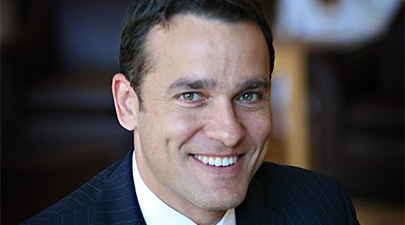Rick Calero, FCLC ’90, joined the Army just a week after graduating from Xavier High School in Manhattan. Years later, one of his Jesuit guidance counselors lamented that the military got him first. “You would have made a great Jesuit,” he said.
Between his time in the Army and his banking career, Calero has worked all over the country and the world. But he never lost sight of the Jesuit principles he grew up on.
“I remained somewhat idealistic about what you can do in life,” he says. “I felt banking could be changed to meet the needs of everyone, not just a subset.”
As president and CEO of TIAA-CREF Trust Co. FSB, Calero has been tasked with creating a bank for teachers, academic communities, hospitals, and other service-oriented professionals, offering mortgages and additional products to help them meet their financial needs. “This is really about helping the difference makers,” he says.
That sense of nobility Calero brings to his work is something he encountered both in the military and in his Jesuit education at Fordham.
“There’s just a value system in both,” he says, whether that system is based on the teachings of Jesus Christ or the U.S. Constitution. “There is a cause greater than yourself,” he adds, noting the “values of courage and selfless service that don’t always exist elsewhere.”
Three years into his first contract with the Army, Calero applied for an ROTC scholarship. He got a call from Fordham and was soon studying economics at Fordham College at Lincoln Center, a few miles from where he grew up on 132nd and Broadway.
Calero says he’s grateful for his Fordham education, not only because of what he learned but of how he learned it.
“It’s not just learning basic skills. It really is critical thinking. Well before you learn something, I think the Jesuits teach you why you should know it,” he says. “You become a continuous learner, where you see learning all around you. It doesn’t just start or stop in the classroom. You spend your whole life learning.”
Right after his Fordham graduation, Calero entered the Army again, separating in 1997 as a captain. “I thought that was it,” he said. Then he got a letter after 9/11. He was promoted to major and sent to Pakistan for 14 months.
During his first stint in the Army in the 1980s, he deployed to Honduras after completing Special Forces training and becoming a Green Beret. It was a time when civil wars and revolution wracked that nation’s Central American neighbors. His experiences in the region played a big role, he says, in understanding the Latin American countries where he did business with Citibank in the late 1990s.
“I would go to every Latin American country and assist with business models, and you recognize that every country is different. Some just did not have a middle class. So how do you grow your business model based on the population?” he said, citing one of many challenges.
His banking career also took Calero to Texas (where his son attended a Jesuit high school), Florida, and most recently, Portland, Oregon, where he was executive vice president of community banking for Umpqua Bank. He returned to New York in 2013 with his wife, Nancy, whom he met in the sixth grade, and their three children.
Calero is one of the newest members of Fordham’s President’s Council, a group of professionals and philanthropists who are committed to mentoring Fordham students, funding key initiatives, and raising the University’s profile. Last year, he mentored a Fordham ROTC student who will be commissioned in May and will go on to active duty. He said he “wanted to do more than donate” to the University when he came back to New York because of the sense of service that Fordham helped instill in him long ago.
“Whether I was the Puerto Rican kid from the Upper West Side or the recent vet,” he says, “Fordham has just always been there.”

